 Petzlover
Petzlover Goldador is originated from United States but Keeshond is originated from Netherlands. Goldador may grow 13 cm / 6 inches higher than Keeshond. Goldador may weigh 18 kg / 40 pounds more than Keeshond. Both Goldador and Keeshond has almost same life span. Goldador may have more litter size than Keeshond. Goldador requires Low Maintenance. But Keeshond requires Moderate Maintenance
Goldador is originated from United States but Keeshond is originated from Netherlands. Goldador may grow 13 cm / 6 inches higher than Keeshond. Goldador may weigh 18 kg / 40 pounds more than Keeshond. Both Goldador and Keeshond has almost same life span. Goldador may have more litter size than Keeshond. Goldador requires Low Maintenance. But Keeshond requires Moderate Maintenance
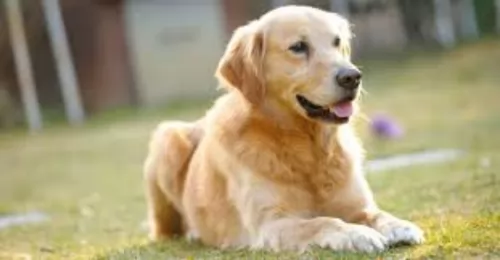 Introduced as a designer dog, the Goldador is beautiful – a mix between Golden Retrievers and Labrador Retrievers, two of the most popular dog breeds in the world.
Introduced as a designer dog, the Goldador is beautiful – a mix between Golden Retrievers and Labrador Retrievers, two of the most popular dog breeds in the world.
The dog was specifically bred to be an excellent working dog, and in fact today he makes the most wonderful guide-, rescue- and therapy dog.
Known also as Golden Labradors, the Goldador is a dog that has many capabilities, one of which is to make a wonderful family pet. As a designer breed, the dog isn’t recognized as a standardized breed by any of the major kennel clubs.
 Keeshond is the term used for German Spitzes and although many American references have it that the Keeshond originated in the Netherlands, some say the dog originated in Germany and is a member of the German Spitz family.
Keeshond is the term used for German Spitzes and although many American references have it that the Keeshond originated in the Netherlands, some say the dog originated in Germany and is a member of the German Spitz family.
The Club for German Spitzes was founded in 1899. The Nederlandse Keeshond Club was formed in 1924. The Keeshond is also referred to as ‘The Smiling Dutchman’.
It was in the 17th and 18th centuries that the Keeshond was used greatly as a watchdog, appearing in England in the late 1800s, but after the turn of the 20th century, Mrs. Wingfield Digby of Dorset, England and Mrs. Alice Gatacre, a Dutch breed authority, living in England, stirred interest in the breed with their kennels.
An English breed Club was formed in 1926, and the first Keeshond was registered with The American Kennel Club in 1930.
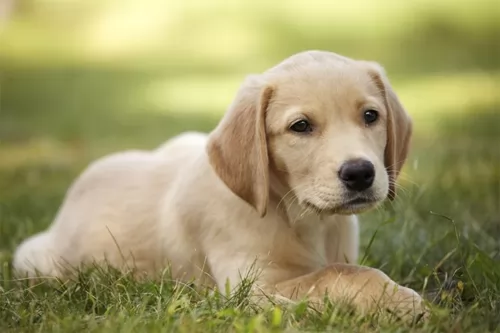 The Goldador is a large muscular dog standing at between 56 – 61cm in height at the withers and weighing between 27 – 36kg in weight.
The Goldador is a large muscular dog standing at between 56 – 61cm in height at the withers and weighing between 27 – 36kg in weight.
His double coat is short and smooth but in can also be longer. It comes in shades of gold or yellow with hints of red, but it can be liver or black too. Goldadors are well-balanced dogs, and just the look in their kind brown eyes makes you realize that this beautiful dog can make a wonderful pet.
He has a well proportioned head with medium length floppy ears, a black nose and a long tail.
Loving, intelligent, loyal and playful, the Goldador is the kind of dog that gets on well with everyone. It’s why he isn’t a particularly good watchdog as he is just too friendly with strangers. You have to be careful though – his rambunctious nature, his energy and playfulness can see him being a bit rough around small children or the elderly. It is why socialization and training are so important for him as then he becomes obedient and more relaxed around everyone.
He loves his human family and never wants to be left on his own for too long. Intelligent and alert, he is an easy dog to train as he makes it easier by being a dog that wants to please.
 The Keeshond is a medium-sized dog and a member of the Spitz group of dogs. He stands at 43 – 48cm in height and weighs 14 – 18kg.
The Keeshond is a medium-sized dog and a member of the Spitz group of dogs. He stands at 43 – 48cm in height and weighs 14 – 18kg.
He has a 2-layered, dense coat which is fairly long, straight and coarse and colors are grey, silver, black and cream. His undercoat is a very light cream color. He has erect ears, a fairly shop muzzle and a feathery, plumed tail which curves over his back.
The hair on his legs is fairly short accompanied with some feathering. A typical marking-feature of the Keeshond is the dark line which runs from the outer corner of each eye to the lower corner of each ear. It's what gives the dog his well known keeshond expression. The eyes of the dog are dark brown.
The Keeshond, just like other Spitz dogs, are playful, affectionate, friendly and eager to please. He is intelligent too and will respond well to training and socialization.
He makes a wonderful family pet as he is friendly and playful with children, loving all their games. He gets on well with other pets too. He is a social dog, thriving on being with his human family, wanting to participate in all family activities.
They are sensitive, loving pets and become very attached to their owners. They have even been used as comfort dogs in rescue situations, as they bond so well with people.
He makes a good watchdog too with his loud bark which he uses to deter intruders. He may well be a good watch- and guard dog but he isn't an aggressive dog.
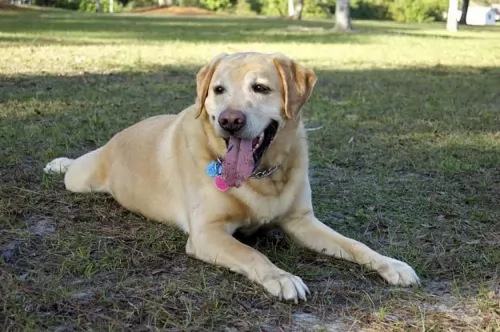 Goldadors are intelligent dogs and they’ve been used extensively for guide- and therapy dogs, loving to be useful and busy. Its the kind of dog that thrives in a loving, active family – one that counts him in as a family member.
Goldadors are intelligent dogs and they’ve been used extensively for guide- and therapy dogs, loving to be useful and busy. Its the kind of dog that thrives in a loving, active family – one that counts him in as a family member.
He makes an exceptional family pet and companion and you can rely on him to be a loyal, loving pet.It’s why the Goldador is becoming such a sought after pet – he simply ticks all the right boxes.
 The Keeshond, with his thick double coat, loves to be outdoors in cool weather. He won't be there too long however, because he will be missing his human family. He is such a social dog, craving human company and therefore isn't a dog to be put out in the backyard and left day after day.
The Keeshond, with his thick double coat, loves to be outdoors in cool weather. He won't be there too long however, because he will be missing his human family. He is such a social dog, craving human company and therefore isn't a dog to be put out in the backyard and left day after day.
He loves games and being totally involved with his human family. Look after your Keeshond well – he is a companion dog - and you will find him to be a most exceptional friend of yours.
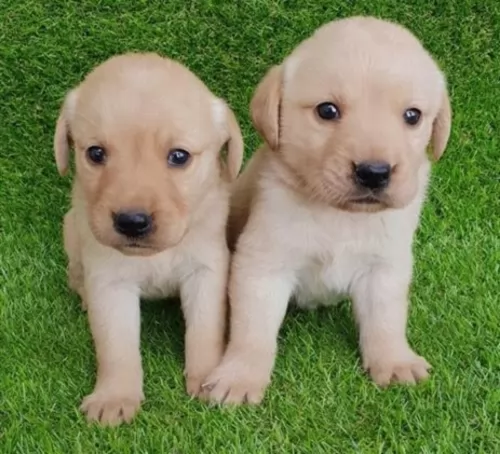 Goldadors luckily don’t have many health issues, and as a hybrid, he has fewer health issues than pure breds.
Goldadors luckily don’t have many health issues, and as a hybrid, he has fewer health issues than pure breds.
You can say with confidence that a nutritious diet, regular exercise, good grooming, lots of love and attention and visits to the vet if your pet is ill are key aspects for maintaining good health.
There are always going to be some common health problems that your Goldie could get -
You’ll need to be checking your Labrador Retriever's floppy ears. They don’t get as much air in them as a dog with erect ears. A dog like the Goldador with floppy ears will need to have his ears cleaned for bacteria. Be very careful how you clean your pet’s ears as you can damage them if you probe too deeply.
Did you know that by spaying or neutering your Goldador can save them from getting some serious illnesses later on? Speak to your vet about it when your pet reaches 9 months to a year of age.
Goldadors can easily put on weight if they aren’t given enough daily exercise to burn off the calories. Some put on weight after being spayed or neutered and it's important to watch their weight after these procedures. Being overweight puts a lot of extra strain on a dog’s internal organs.
 With good food, fresh water, exercise and lots of interaction with your Keeshond, he can reach 12 to 14 years of age.
With good food, fresh water, exercise and lots of interaction with your Keeshond, he can reach 12 to 14 years of age.
No matter how healthy your dog is, he can still get ill, but the chances are less likely when he is feed nutritionally. Nonetheless look out for hip dysplasia, bloat, ear infections, skin rashes and eye diseases.
This is a problem in the lens of the eye. Your dog has a cloudy look to the eye. A cataract can occur when the cells are damaged. A disease such as diabetes can also cause a cataract and high blood sugar levels can change the metabolism of the cells in the lens.
The lens should be crystal clear, but with a cataract, the vision of the dog is obscured. It can cause blindness. Thankfully, cataracts aren't painful and most times dogs with cataracts can still see. There is the option of surgery to remove them too.
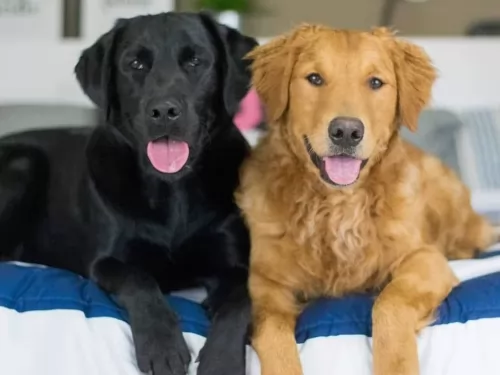 Goom your Goldador regularly. He can either have short- or long hair, but he is a fairly low maintenance dog so a good brush twice a week to remove loose hairs will be good for him.
Goom your Goldador regularly. He can either have short- or long hair, but he is a fairly low maintenance dog so a good brush twice a week to remove loose hairs will be good for him.
Diet is everything, and by giving your Goldador nutritional food, you can actually lengthen his life. If you’re going to be giving him commercially manufactured food, follow the feeding guidelines on the packaging. Remember there are foods that cater specifically for a dogs age and his energy levels.
Try and give him some home-made food from time to time such as cooked rice, vegetables and chicken as well as some raw meat occasionally as this can ensure his skin and coat remain healthy.
Always provide plenty of cool, fresh water, especially seeing that he will be thirsty after a long walk or other exercise. Dehydration in a dog can be fatal.
Provide your Goldador with a warm, dry place to sleep. Make sure that it offers shelter from the sun and rain and also provides shade.
 With his double coat, your Keeshond will need regular brushing to get rid of all those loose hairs. He is a dog which doesn't have that typical dog odor about him so bathing him is discouraged. Too much bathing irritates a dog's skin and dries it out.
With his double coat, your Keeshond will need regular brushing to get rid of all those loose hairs. He is a dog which doesn't have that typical dog odor about him so bathing him is discouraged. Too much bathing irritates a dog's skin and dries it out.
Check the inside of his mouth and make sure that his teeth are in a healthy state. If you are unsure, speak to your vet about dental hygiene as bad teeth won't only cause pain and discomfort for your pet, the teeth can affect his immune system and other body parts.
Check his claws too and have them cut when they become too long. When they are long they can hook on things and injure the sensitive area of the paws.
The Keeshond is a sturdy dog, loving all the activities and games that his family are involved in. He will love to be your walking companion and looks forward to his walk every day.
He is such a playful, adventurous dog and is always willing to join you in new games. Never put him in your back garden and forget about him, as this will make him ill and depressed. He must be part of the family to be healthy and happy and relies on you to include him in all your activities. He can live in the city or the countryside but will require being exercised wherever he is.
Top quality dry kibble will work for your Keeshond. If you want to keep him bright eyed and bushy tailed, mix in some quality home-made food too such as cooked chicken, rice and vegetables. You can also try to sometimes include a little bit of raw meat as well.
He is an active dog and will need a diet high in protein. Also, his thick coat needs to be maintained, and apart from regular brushing, look for quality dog foods that have Omega-3 fatty acids in them so as to maintain the skin and coat of the dog. Make sure he always has access to fresh, cool water.